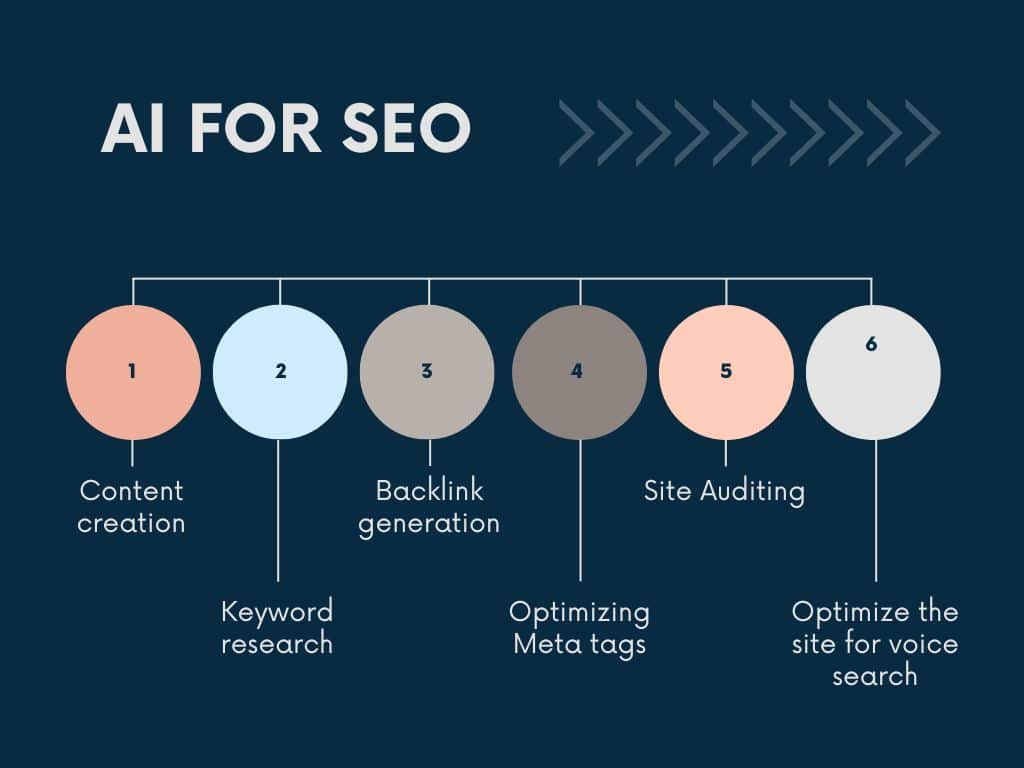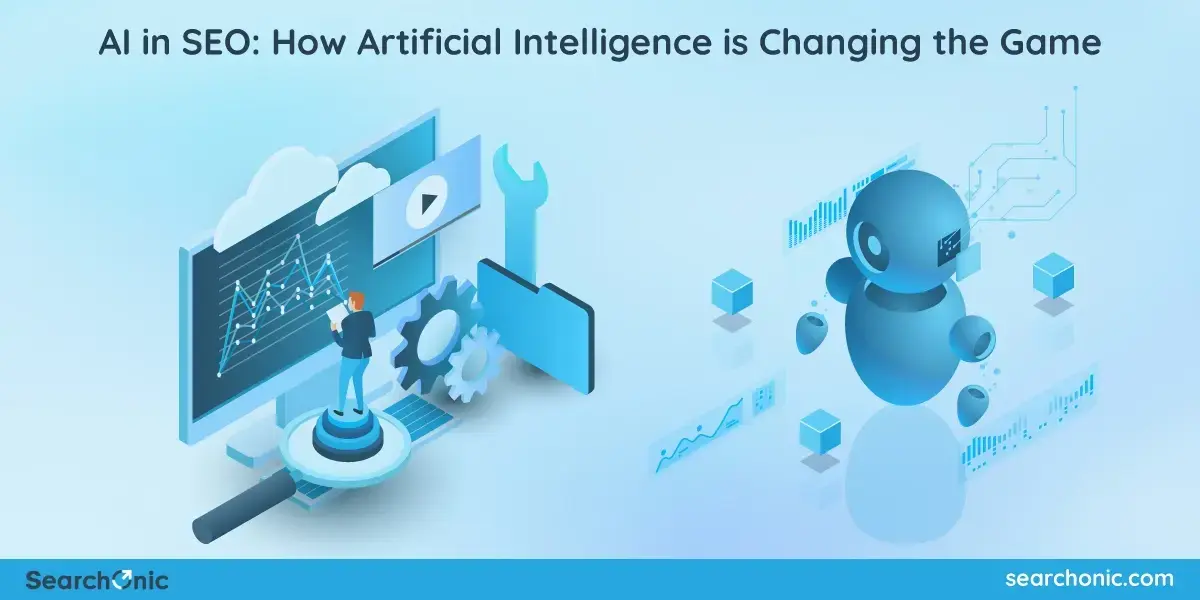Search Engine Optimization (SEO) has been a cornerstone of digital marketing for over two decades, but in recent years, Artificial Intelligence (AI) has radically transformed how businesses approach SEO. From enhancing keyword research to optimizing content and improving user experience, AI is fundamentally reshaping SEO strategies, making them smarter, faster, and more effective.
In this in-depth blog, we’ll explore the evolution of SEO and how AI is changing the game for businesses aiming to rank higher, attract more organic traffic, and stay competitive in 2024 and beyond.
Table of Contents:
- The Early Days of SEO: A Brief History
- How AI is Enhancing Keyword Research and Analysis
- AI-Powered Content Optimization for Higher Rankings
- How AI is Improving User Experience (UX) and Search Intent
- AI and Voice Search Optimization
- AI in Predictive Analytics for SEO
- The Future of SEO: What to Expect in the AI Era

1. The Early Days of SEO: A Brief History
SEO wasn’t always the sophisticated, data-driven process it is today. In the late 1990s and early 2000s, SEO was mostly about keyword stuffing and backlink building. Google’s algorithm was relatively simple, focusing on keyword density and the quantity of inbound links as primary ranking factors. This led to manipulative practices where websites would pack pages with irrelevant keywords and buy low-quality backlinks to rank higher in search results.
However, as search engines like Google improved, they introduced algorithm updates like Panda, Penguin, and Hummingbird to penalize black-hat SEO tactics and reward websites offering real value to users. These updates emphasized quality content, user intent, and authority.
The SEO landscape has shifted dramatically since those early days, with Artificial Intelligence (AI) now playing a major role in how search engines work and how SEO strategies are developed.
2. How AI is Enhancing Keyword Research and Analysis
Keyword research has always been at the core of SEO, but AI has taken it to new levels of precision and relevance. Traditional keyword research tools rely on historical data to suggest keywords, but with AI, SEO professionals can now access more intelligent insights about how users are searching and what they really want.
AI-powered tools like Google’s RankBrain and AI-based SEO platforms like Ahrefs, Semrush, and Moz use machine learning to analyze search behavior and predict emerging trends in search queries. These tools are better equipped to identify long-tail keywords, semantic search phrases, and related queries that traditional keyword research methods might miss.
Key benefits of AI in keyword research:
- Smarter keyword suggestions: AI tools can suggest keywords based on user intent, search trends, and contextual relevance.
- Competitive analysis: AI can analyze competitors’ keywords and identify gaps where your website can rank higher.
- Predictive insights: AI helps forecast changes in keyword demand, allowing businesses to adjust their content strategies ahead of time.

Example: Google’s RankBrain, an AI algorithm, goes beyond just matching exact keywords and instead understands the meaning behind them. It can identify synonyms, related terms, and user intent, making search results more accurate and contextually relevant.
3. AI-Powered Content Optimization for Higher Rankings
In the past, SEO content creation was all about focusing on keywords. However, AI has revolutionized how content is created, optimized, and structured to ensure higher rankings on search engines. AI-powered content optimization goes beyond keyword density and focuses on delivering value-driven content that aligns with user intent and search algorithms.
AI-driven content optimization tools like Clearscope, SurferSEO, and Frase analyze top-ranking pages for a given keyword, helping content creators understand what makes those pages rank well. They look at content structure, readability, semantic relevance, and even user engagement metrics like time spent on the page and bounce rates.
How AI improves content optimization:
- Semantic search optimization: AI understands the relationships between different terms, allowing content to rank for multiple related queries rather than just one keyword.
- Content gap analysis: AI identifies areas where your content is lacking compared to high-ranking competitors.
- Natural language generation: AI-powered tools like GPT-3 can assist in creating human-like content that resonates with readers and search engines.
Example: SurferSEO analyzes hundreds of factors, including keyword density, internal linking, and content length, to suggest actionable insights on how to optimize content for higher rankings.
4. How AI is Improving User Experience (UX) and Search Intent
User experience (UX) is now a critical factor in SEO. Search engines like Google are no longer just looking for pages that match a keyword—they’re looking for pages that satisfy user intent and provide a seamless experience. AI is helping businesses optimize their websites for better user engagement, which in turn improves SEO rankings.
AI can monitor user behavior metrics such as:
- Click-through rates (CTR)
- Bounce rates
- Time spent on the page
- Interaction with on-page elements
By analyzing these metrics, AI tools can identify pages that underperform and suggest improvements, such as faster loading times, better navigation, and more engaging content.
How AI enhances UX:
- Personalization: AI can deliver personalized content recommendations based on users’ behavior, improving user engagement.
- Improved site navigation: AI-powered chatbots and recommendation engines guide users to relevant information faster, reducing bounce rates.
- Visual content optimization: AI can analyze how users interact with videos, images, and infographics, helping businesses optimize multimedia content for better SEO.
Example: Google’s RankBrain uses AI to measure user satisfaction with search results. If users frequently click on a link and immediately return to the search results, Google takes this as a sign that the page did not meet their expectations, leading to lower rankings.
5. AI and Voice Search Optimization
With the rise of virtual assistants like Siri, Google Assistant, and Alexa, voice search has become a significant player in SEO. AI-powered voice recognition systems are changing the way users interact with search engines, and optimizing for voice search requires a different approach than traditional SEO.
Voice search queries are typically longer, more conversational, and often framed as questions. AI helps businesses optimize their content by:
- Focusing on long-tail keywords and natural language processing (NLP).
- Optimizing for featured snippets, which are often used to answer voice search queries.
- Structuring content to provide clear, concise answers to common questions.
Key tips for optimizing for voice search:
- Write content in a conversational tone.
- Use structured data (schema markup) to help search engines understand your content.
- Focus on answering “who,” “what,” “where,” “when,” “why,” and “how” questions that users are likely to ask via voice search.
Example: If a user asks, “What’s the best Italian restaurant near me?”, AI algorithms process location data, user preferences, and restaurant reviews to deliver the most relevant result.
6. AI in Predictive Analytics for SEO
Predictive analytics is another area where AI is making a massive impact on SEO. By analyzing vast amounts of data from search engines, social media, and customer interactions, AI can predict future trends and user behavior.
This allows businesses to stay ahead of the curve by creating content and optimizing their websites for keywords and trends that are likely to become popular in the near future.
How predictive analytics enhances SEO:
- Content forecasting: AI can identify which types of content are likely to perform well based on historical data and emerging trends.
- Trend prediction: AI-powered tools can spot rising topics or keywords before they peak in popularity, giving businesses a head start on their SEO strategy.
- Dynamic content optimization: Predictive analytics can help businesses adjust their SEO strategies in real-time based on user behavior and algorithm changes.
Example: AI tools like MarketMuse and BrightEdge use predictive analytics to recommend content updates and new topic opportunities based on emerging trends in search behavior.
7. The Future of SEO: What to Expect in the AI Era
As AI continues to evolve, we can expect even more automation and personalization in SEO. Businesses will rely increasingly on AI-driven tools to manage SEO at scale, optimize content for diverse user intents, and adapt to constantly changing algorithms.
Key trends to watch in the AI-driven SEO future:
- Hyper-personalized search results: AI will continue to enhance personalization, delivering search results tailored to individual preferences, search history, and behavior patterns.
- Visual and video SEO: AI-powered image and video recognition will play a larger role in search, allowing search engines to better understand multimedia content.
- Automation of technical SEO tasks: AI will handle more technical aspects of SEO, such as crawling, indexing, and resolving website issues automatically.
Conclusion
AI is transforming SEO in ways that were unimaginable just a few years ago. From smarter keyword research and content optimization to enhanced user experience and predictive analytics, AI is helping businesses create more targeted, relevant, and efficient SEO strategies.
By embracing AI in your SEO efforts, you can stay ahead of the competition, adapt to changing search behaviors, and ensure that your business continues to rank well in an increasingly competitive digital landscape.




Leave a Reply